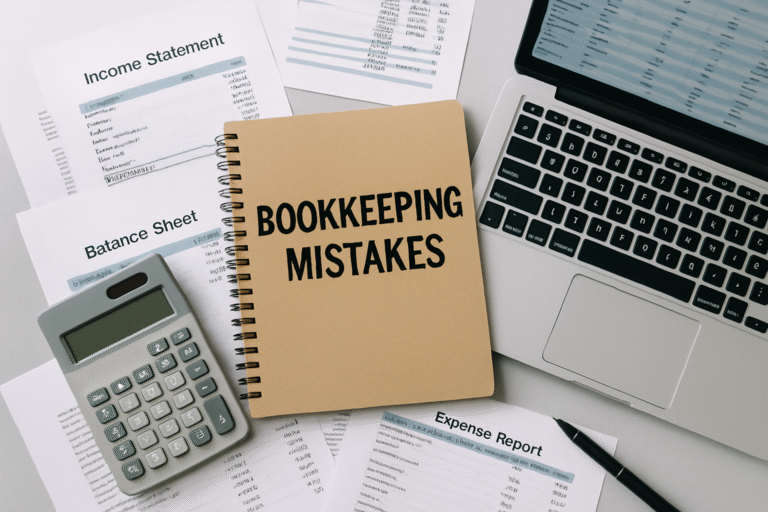Top 10 Bookkeeping Mistakes Small Business Owners Make — And How to Avoid Them
Keeping Your Books Clean = Peace of Mind
Bookkeeping may not be the most exciting part of running a business, but it is one of the most important. Small errors can lead to big financial headaches — from missed deductions and cash flow issues to IRS fines and tax season panic.
Whether you’re doing your own books or outsourcing, here are 10 common bookkeeping mistakes small business owners make — and exactly how to avoid them.
1. Mixing Personal and Business Finances
Why it’s a problem: Blending personal and business expenses creates messy records and makes it harder to track profitability.
How to avoid it:
- Open a separate business bank account
- Use a dedicated business credit card
- Pay yourself formally instead of “just using the card”
2. Not Reconciling Bank Statements
Why it’s a problem: Without reconciling, you could miss errors, double entries, or fraudulent charges.
How to avoid it:
- Reconcile monthly using bookkeeping software like QuickBooks, Wave, or Xero
- Set a recurring reminder to review bank statements
3. Falling Behind on Data Entry
Why it’s a problem: When transactions pile up, you lose track of spending, and categorization becomes guesswork.
How to avoid it:
- Set aside time weekly (even 30 minutes!) to update your books
- Automate data entry with bank feeds or integrations
4. Not Tracking Receipts or Supporting Documents
Why it’s a problem: Come tax time, you may lose out on deductions — or worse, not be able to back up your numbers in an audit.
How to avoid it:
- Use an app like Dext, Hubdoc, or QuickBooks mobile to snap receipts on the go
- Store files in organized folders labeled by month or category
5. Misclassifying Expenses
Why it’s a problem: Putting expenses in the wrong category skews your reports and may affect tax deductions.
How to avoid it:
- Use a consistent chart of accounts
- Review categories with a bookkeeper or accountant at least quarterly
6. Not Backing Up Your Data
Why it’s a problem: Tech fails happen — and if your data’s gone, so is your financial history.
How to avoid it:
- Use cloud-based software that automatically backs up your data
- Export and save key reports monthly
7. Forgetting to Track Accounts Receivable and Payable
Why it’s a problem: You can lose track of who owes you (and who you owe), which strains cash flow.
How to avoid it:
- Create a system to follow up on invoices
- Use aging reports in your accounting software
- Record bills and due dates, not just when they’re paid
8. DIYing Too Long
Why it’s a problem: What works for a solopreneur doesn’t always scale with growth. Errors get expensive.
How to avoid it:
- Know when to outsource to a bookkeeper or accountant
- Even a quarterly check-in with a pro can prevent bigger problems
9. Ignoring Financial Reports
Why it’s a problem: If you don’t regularly review your P&L, balance sheet, and cash flow, you’re flying blind.
How to avoid it:
- Schedule a monthly financial check-in
- Learn to read basic reports — they’re your roadmap to profitability
10. Waiting Until Year-End to “Catch Up”
Why it’s a problem: Playing catch-up all at once invites errors and missed deductions — and makes tax prep a nightmare.
How to avoid it:
- Bookkeeping is a year-round task, not just a tax season scramble
- Block monthly time on your calendar to stay on top of it
Final Thoughts
Mistakes happen — but the more you know, the more you can avoid them. Keeping your books clean isn’t just about staying organized; it’s about building a business that’s sustainable, profitable, and ready to grow.
You don’t need to be a numbers whiz to keep your finances on track — just a few consistent habits (and a good system) can go a long way.
What’s Next?
- 💬 Need a bookkeeping checklist? [COMING SOON: Free Download]
- 📚 Read Next: Cash Flow Forecasting for Beginners



